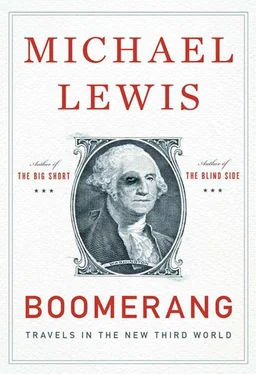The Danske Bank report alerted hedge funds in London to an opportunity: shorting Iceland. They investigated and found this incredible web of cronyism: bankers buying stuff from one another at inflated prices, borrowing tens of billions of dollars and relending it to the members of their little Icelandic tribe, who then used it to buy up a messy pile of foreign assets. “Like any new kid on the block,” says Theo Phanos, of Trafalgar Asset Managers, in London, “they were picked off by various people who sold them the lowest-quality assets—second-tier airlines, sub-scale retailers. They were in all the worst LBOs.”
But from the prime minister on down, Iceland’s leaders attacked the messenger. “The attacks . . . give off an unpleasant odor of unscrupulous dealers who have decided to make a last stab at breaking down the Icelandic financial system,” said Central Bank chairman Oddsson in March 2009. The chairman of Kaupthing publicly fingered four hedge funds that he said were deliberately seeking to undermine Iceland’s financial miracle. “I don’t know where the Icelanders get this notion,” says Paul Ruddock, of Lansdowne Partners, one of those fingered. “We only once traded in an Icelandic stock and it was a very short-term trade. We started to take legal action against the chairman of Kaupthing after he made public accusations against us that had no truth, and then he withdrew them.”
One of the hidden causes of the current global financial crisis is that the people who saw it coming had more to gain from it by taking short positions than they did by trying to publicize the problem. Plus, most of the people who could credibly charge Iceland—or, for that matter, Lehman Brothers—with financial crimes could be dismissed as crass profiteers, talking their own book. Back in April 2006, however, an emeritus professor of economics at the University of Chicago named Bob Aliber took an interest in Iceland. Aliber found himself at the London Business School, listening to a talk on Iceland, about which he knew nothing. He recognized the signs instantly. Digging into the data, he found in Iceland the outlines of what was so clearly a historic act of financial madness that it belonged in a textbook. “The Perfect Bubble,” Aliber calls Iceland’s financial rise, and he has the textbook in the works: an updated version of Charles Kindleberger’s 1978 classic, Manias, Panics, and Crashes. Aliber is editing the new edition. In it, Iceland, he decided back in 2006, would now have its own little box, along with the South Sea Bubble and tulip mania—even though Iceland had yet to crash. For him the actual crash was a mere formality.
Word spread in Icelandic economic circles that this distinguished professor at Chicago had taken a special interest in Iceland. In May 2008, Aliber was invited by the University of Iceland’s economics department to give a speech. To an audience of students, bankers, and journalists, he explained that Iceland, far from having an innate talent for high finance, had all the markings of a giant bubble, but he spoke the technical language of academic economists. (“Monetary Turbulence and the Icelandic Economy,” he called his speech.) In the following Q&A session someone asked him to predict the future, and he lapsed into plain English. As an audience member recalls, Aliber said, “I give you nine months. Your banks are dead. Your bankers are either stupid or greedy. And I’ll bet they are on planes trying to sell their assets right now.”
The Icelandic bankers in the audience sought to prevent newspapers from reporting the speech. Several academics suggested that Aliber deliver his alarming analysis to Iceland’s Central Bank. Somehow that never happened. “The Central Bank said they were too busy to see him,” says one of the professors who tried to arrange the meeting, “because they were preparing the Report on Financial Stability .” For his part Aliber left Iceland thinking that he’d caused such a stir he might not be allowed back into the country. “I got the feeling,” he told me, “that the only reason they brought me in was that they needed an outsider to say these things—that an insider wouldn’t say these things, because he’d be afraid of getting into trouble.” And yet he remains extremely fond of his hosts. “They are a very curious people,” he says, laughing. “I guess that’s the point, isn’t it?”
Icelanders—or at any rate Icelandic men—had their own explanations for why, when they leapt into global finance, they broke world records: the natural superiority of Icelanders. Because they were small and isolated, it had taken 1,100 years for them—and the world—to understand and exploit their natural gifts, but now that the world was flat and money flowed freely, unfair disadvantages had vanished. Iceland’s president, Ólafur Ragnar Grimsson, gave speeches abroad in which he explained why Icelanders were banking prodigies. “Our heritage and training, our culture and home market, have provided a valuable advantage,” he said, then went on to list nine of these advantages, ending with how unthreatening to others Icelanders are. (“Some people even see us as fascinating eccentrics who can do no harm.”) There were many, many expressions of this same sentiment, most of them in Icelandic. “There were research projects at the university to explain why the Icelandic business model was superior,” says Gylfi Zoega, chairman of the economics department. “It was all about our informal channels of communication and ability to make quick decisions and so forth.”
“We were always told that the Icelandic businessmen were so clever,” says university finance professor and former banker Vilhjálmur Bjarnason. “They were very quick. And when they bought something they did it very quickly. Why was that? That is usually because the seller is very satisfied with the price.”
You didn’t need to be Icelandic to join the cult of the Icelandic banker. German banks put $21 billion into Icelandic banks. The Netherlands gave them $305 million, and Sweden kicked in $400 million. UK investors, lured by the eye-popping 14 percent annual returns, forked over $30 billion—$28 billion from companies and individuals and the rest from pension funds, hospitals, universities, and other public institutions. Oxford University alone lost $50 million.
Maybe because there are so few Icelanders in the world, we know next to nothing about them. We assume they are more or less Scandinavian—a gentle people who just want everyone to have the same amount of everything. They are not. They have a feral streak in them, like a horse that’s just pretending to be broken.
AFTER THREE DAYS in Reykjavík, I receive, more or less out of the blue, two phone calls. The first is from a producer of a leading current-events TV show. All of Iceland watches her show, she says, then asks if I’d come on and be interviewed.
“About what?” I ask.
“We’d like you to explain our financial crisis,” she says.
“I’ve only been here three days!” I say.
It doesn’t matter, she says, as no one in Iceland understands what’s happened. They’d enjoy hearing someone try to explain it, even if that person didn’t have any idea what he was talking about—which goes to show, I suppose, that not everything in Iceland is different from other places. As I demur, another call comes, from the prime minister’s office.
Iceland’s then prime minister, Geir Haarde, was also the head of the Independence Party, which governed the country from 1991 to 2009. It ruled in loose coalition with the Social Democrats and the Progressive Party. (Iceland’s fourth major party is the Left-Green Movement.) That a nation of 300,000 people, all of whom are related by blood, needs four major political parties suggests either a talent for disagreement or an unwillingness to listen to one another. In any case, of the four parties, the Independents express the greatest faith in free markets. The Independence Party is the party of the fishermen. It is also, as an old schoolmate of the prime minister’s puts it to me, “all men, men, men. Not a woman in it.”
Читать дальше












